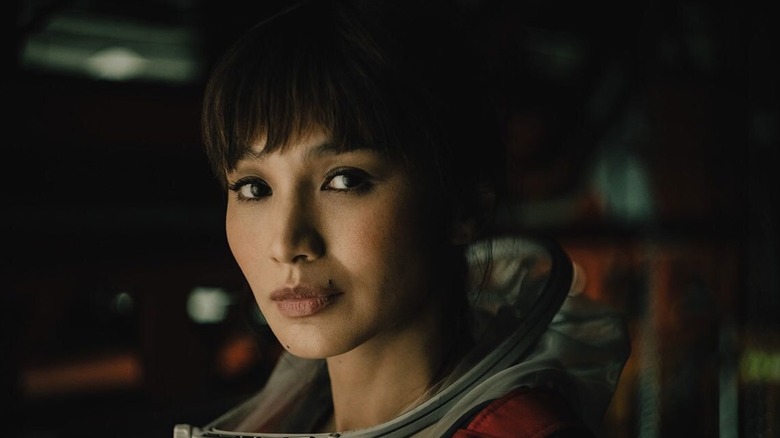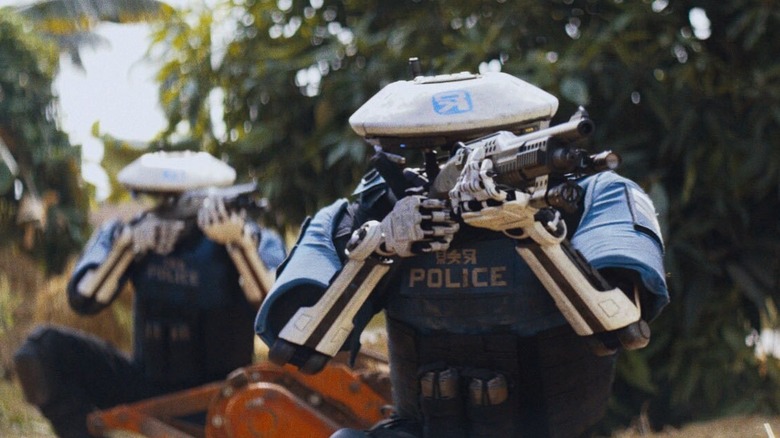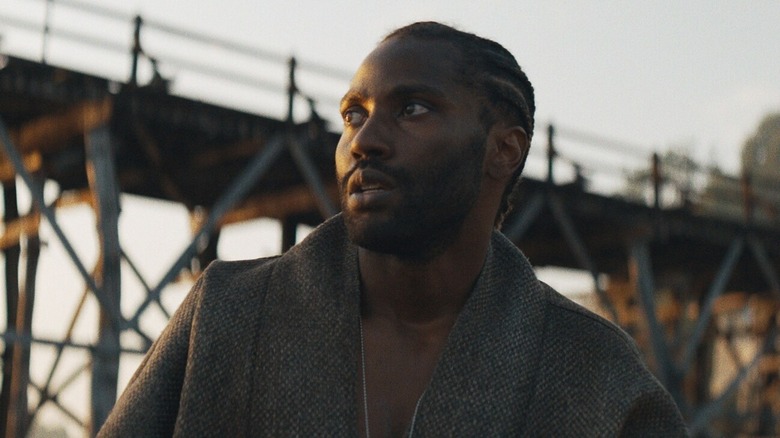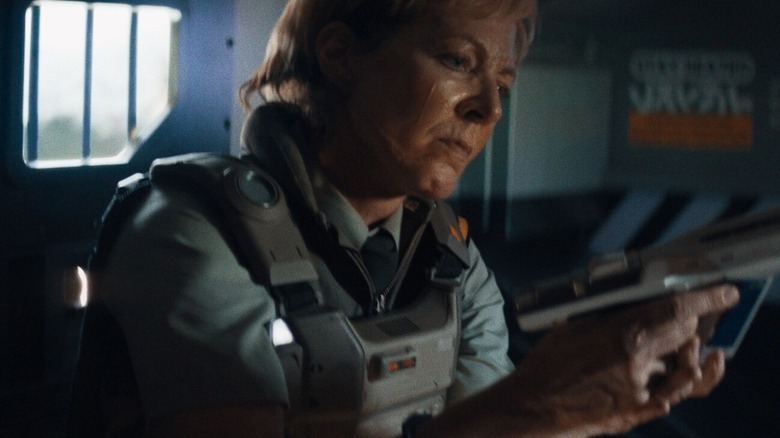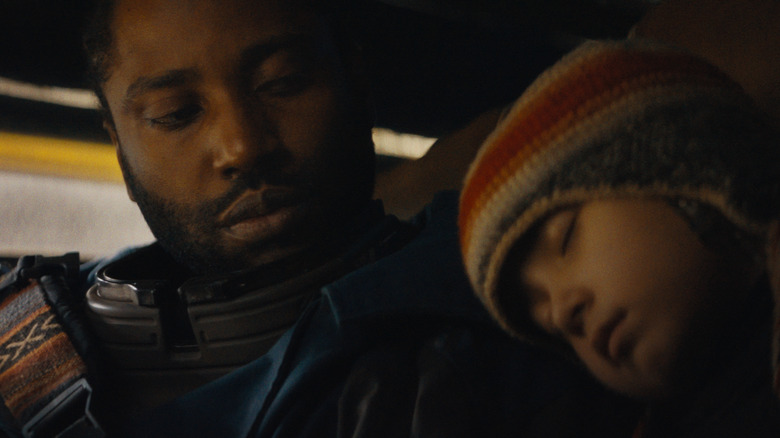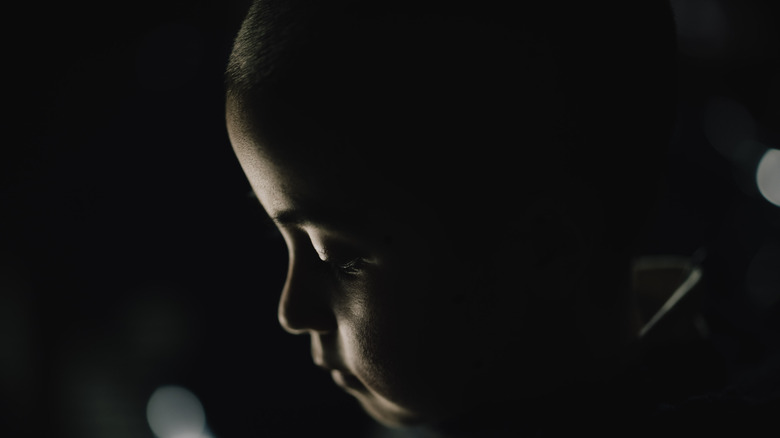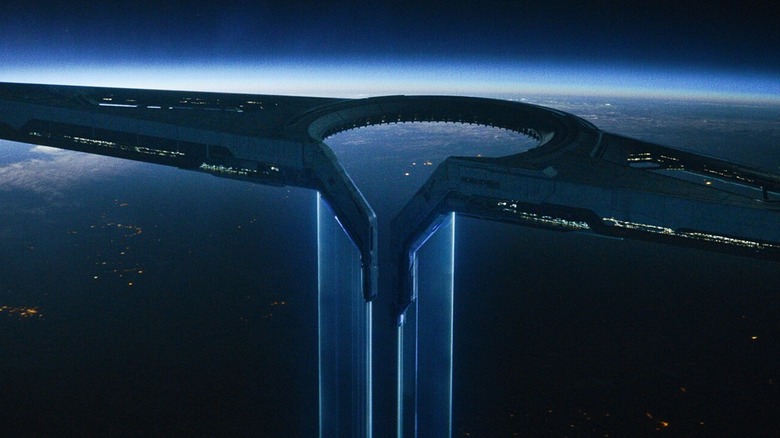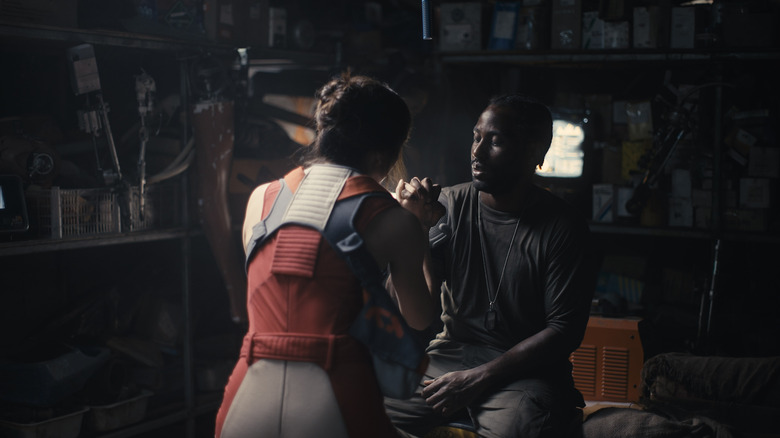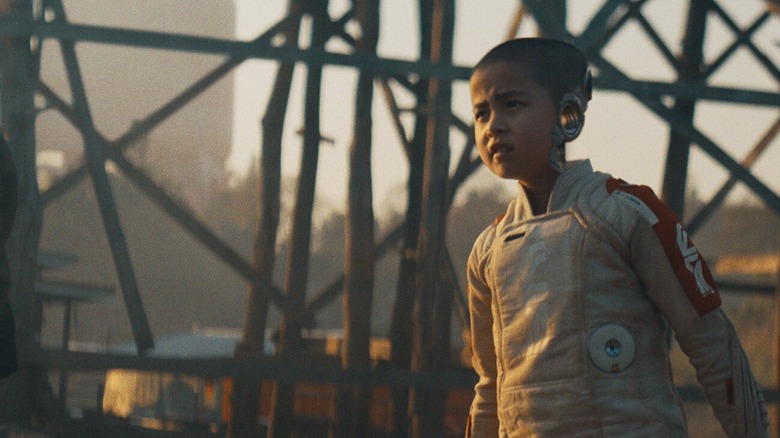The Creator Ending Explained: Pretty Fly For An A.I.
This post contains major spoilers for "The Creator."
"There is no creation without destruction." That axiom is one so generally regarded as being perpetually true that it (or a version of it) has been attributed to such disparate figures as Oda Nobunaga, Ramana Maharshi, and Pablo Picasso. When applied to nature, it seems almost self-evident; even the act of reproduction and birth can be damaging (if not fatal) to those who seek to reproduce.
When applied to the whole of human history, it seems troubling truthful, too. So much of humanity has been plagued by a cascading series of deadly conflicts that end up begetting instances of cultural and social progress. War, like all conflict, is an agent of change, an event that ensures nothing will be exactly the same after it's over. In that way, it can be seen as a twisted form of creation as well as destruction, with life forcing itself to persevere through adversity.
It's these themes that co-writer/director Gareth Edwards touches upon in his latest film, "The Creator." Like all good filmmakers working in a genre space, Edwards and co-writer Chris Weitz use their original narrative to explore and comment on a number of issues both timely (the rise of artificial intelligence) and timeless (war, prejudice, parenthood, and so on). Though, in some ways, "The Creator" is a tale many of us have seen before, it's through Edwards' unique take on the themes, visuals, and characters that the movie's musing on the nature of creation becomes compelling, especially as it's viewed on both a macro and micro level simultaneously.
Aye, robot
Much like Edwards' debut feature, "Monsters," "The Creator" begins by having to set the cinematic table for its sci-fi universe, using the device of a vintage newsreel to set the retro-futurist tone of the film. As the rise of artificial intelligence is chronicled from simple robotics to independent entities, resulting in the general look of the AI characters seen through the rest of the movie (a mixture of faceless humanoids called Robots and AI with a mixture of human likenesses and mechanical parts known as Simulants), the newsreel is interrupted by footage of Los Angeles being decimated by a nuclear blast, an attack supposedly perpetrated by AI.
It's explained that, subsequent to the explosion, the U.S.A. has not only banned AI outright, but made it their mission to eradicate the species from the entire planet. This is easier said than done, of course, because not only have AI evolved to the point of being a recognizably sentient and separate species, but the remnants of their race exist under the protection of the Republic of New Asia. U.S. authorities are quick to point out that the countries themselves are not at war, but they so insist on AI being eradicated that they've constructed a giant mobile space station named NOMAD which can hunt and decimate any AI communities from above without a literal, physical incursion into New Asian territory. Effectively, the world has entered into a new Cold War.
Family lies
With a Cold War comes spies, and one of the most successful — not to mention most insidious — is special forces soldier Joshua Taylor (John David Washington), who is given the assignment of infiltrating New Asia in the year 2065. He's not just there to gather intel on the AI communities, though, as his orders are to find the fabled human creator of AI themselves, a figure the populace refer to as Nirmata (Nepali for "the creator," natch).
Once informed that a woman named Maya (Gemma Chan) is Nirmata's daughter, Taylor cozies up to her, eventually seducing and marrying her. This isn't a man sublimating his identity for the cause, however, as Taylor genuinely falls for Maya, and the two plan on having a child together. One night, U.S. forces and NOMAD attack the part of the coast of New Asia where Taylor and Maya live. A friend of the couple, the AI insurgent leader Harun (Ken Watanabe), captures an American soldier, Drew (Sturgill Simpson), bringing him to Taylor and Maya for questioning. Taylor secretly interrogates his friend and comrade Drew, demanding to know why the strike was ordered early; Drew only groggily says, "to kill Nirmata."
Unfortunately, Maya witnesses part of this conversation, and Taylor's cover is blown, not to mention his relationship. Fleeing with her AI compatriots, Taylor tries desperately to explain himself and stop Maya, but she makes it out to the ocean — where NOMAD fires, killing her and her unborn baby.
The raid: redemption?
Five years later, a broken Taylor lives in the ruins of Los Angeles, working as one of the many cleanup crews in the aftermath of the city's destruction when he's approached by General Andrews (Ralph Ineson) and Colonel Howell (Allison Janney) with a new mission. They want Taylor, using his knowledge of the enemy terrain, to accompany a strike team back into New Asia in order to infiltrate Nirmata's lab, which allegedly contains a new superweapon known only as "Alpha O" (as in Alpha and Omega, referencing the Holy Bible). Taylor remains unswayed, until Howell plays a bit of footage revealing that Maya is still alive.
Deploying into New Asia, Taylor and the U.S. soldiers find the lab hidden peacefully below a human shantytown village, the film beginning to demonstrate how AI are attempting to co-exist with humanity rather than wipe them out. As the American raid begins to go south, Taylor desperately tries to find any sign of Maya. Instead, he happens upon the AI superweapon, which isn't a weapon at all: it's a young robot girl (Madeleine Yuna Voyles), kept locked away in secret.
Hoping he can trade the girl for Maya's guaranteed safety, Taylor escapes the lab before it's destroyed by NOMAD (as is, presumably, the village that harbored it). Before he can rendezvous with Howell, the Colonel is captured by local police, and Taylor discovers why the girl is so important: she has the ability to remotely control everything electronic within a certain radius around her. Refusing to kill her as Howell had ordered, Taylor decides to enlist Alphie's help in finding Maya. The girl only says that Maya is in "heaven," a place she believes neither she nor Taylor can go.
The last of them
Taylor and Alphie make their way across New Asia in very "Lone Wolf and Cub" fashion (or "The Last Of Us" fashion, if you like), eventually finding Drew, who's living a quiet life at a Sim factory along with his Sim girlfriend, Kami (Veronica Ngo). When Drew examines Alphie, he realizes that the girl will grow and age like any other human, and so will her powers, allowing her to eventually completely control every bit of technology on the planet. Taylor and Drew realize that, in essence, this makes Alphie a God, a figure with power over sentient life.
Now it's even more understandable why both U.S. military forces (in the form of an escaped Howell and her henchman, McBride, played by Marc Menchaca) and New Asian authorities (led by a Sim played by Amar Chadha-Patel) are after Alphie, and both Kami and Drew perish while trying to get Taylor and the girl to safety. Before he dies (ironically at the hands of an AI insurgency force led by Harun), Drew helps Taylor follow the tracker placed in Maya's wedding ring to the ruins of their old beach house where the couple were originally attacked. Drew reveals that the raid did not occur early, as Taylor had believed, because just prior to the attack, it was discovered that Maya herself is Nirmata.
Harun takes Taylor and Alphie back to their village, where the leader reveals that he refuses to take Taylor to Maya/Nirmata (because that's exactly what his U.S. military pursuers want him to do) and that, given Alphie's still nascent powers, the AI forces hope to get her physically into NOMAD so she can destroy it and turn the tide of the war. They realize that this would be fatal to her, but if her destruction means the creation of peace, so be it.
The holy Mother
Before any of this can happen, Howell and the U.S. army attack the AI village, and Alphie insists on assisting her brethren before Taylor can spirit her away. Alphie almost calms a military robot into stopping its self-destruction sequence, but fails, and is injured in the process. Harun agrees to take Taylor and Alphie to the temple where Maya is in order to heal Alphie.
There's another reason Harun wants Taylor to see his wife again: the woman has been in a coma ever since the NOMAD attack, where she lost her child five years prior, and the Sim monks watching over her, who are forbidden from harming Nirmata, cannot shut off her life support. Taylor learns that Alphie was completed by Maya just prior to that attack, her likeness scanned from Maya's unborn baby. Alphie begs her "father" to end Mother's misery, an act of mercy that also carries a religious implication: Maya cannot be "reborn" into the next life without passing through death. This all ties into the film's exploration of death as another state of being: from the start, Taylor explained to Alphie his belief that Sims and Robots couldn't die, just simply be turned "off."
Now faced with turning the love of his life "off," Taylor complies, understanding that Alphie's emotions make her just as real as he is. Howell arrives, and though Alphie attempts to save her, Howell's human soldiers display their bigoted ignorance, and a wounded Harun ends her life with a sticky grenade. Harun implores Taylor to get Alphie to NOMAD, and Taylor and Alphie are captured by the US army, with Taylor being told he's a national hero for finally killing Nirmata.
NOMAD's land
Now back in Los Angeles, a frustrated General Andrews asks Taylor to execute Alphie humanely with an EMP device, as Alphie has fended off all other attempts to end her existence. Yet "The Creator" isn't done exploring the different meanings and stages of "death." Taylor agrees to help, knowing that he can adjust the EMP device to only temporarily stop Alphie's vital signs in order to fool the soldiers and smuggle Alphie out of incarceration: as he whispers to Alphie, "It's not 'off,' just standby."
Taylor and Alphie escape in this manner, making their way to a nearby spaceport and boarding a commercial flight, where Alphie uses her powers to make the craft dock on NOMAD. Andrews orders the final strike on the last remaining AI communities immediately, and Taylor and Alphie go to work, with Taylor planting a bomb while Alphie stops the craft from firing its entire payload. A few missiles sneak through, destroying a couple New Asian AI outposts.
After Alphie attempts to boot up a Sim with Maya's likeness (more on that in a moment), she makes her way to an escape pod, where she's menaced by a military drone. Taylor sacrifices himself in order to fend off the drone and make sure Alphie's pod escapes safely, just as the bomb explodes and NOMAD begins to be destroyed.
Not programming, just real
Throughout "The Creator," Taylor is shown to be heavily bigoted against AI, viewing them as nothing more than mere machines despite their obvious individuality and sentience — as he keeps saying, "They're not real, it's just programming." Complicating matters further is the fact that human beings are able to (and do) donate their likenesses to the Simulants, meaning that a number of Sims share the same face and voice, including Maya's.
Thanks to his experience with Maya and especially Alphie, Taylor comes around to seeing how existence and "humanity" aren't limited to one's physical body, and that human beings are susceptible to "programming" as much as any Robot is. There's an ambiguity to the film's philosophy as well as its characters: "This love is real," Taylor tells Maya after she discovers his dual identity, and he's both right and wrong in that moment. During the movie, Taylor learns that what is "real" is subjective, especially in the film's Brave New World of technology blurring the lines.
One of the devices Howell uses to extract info from her prey is a scanner that can map the brain patterns of a person, seemingly only after they've died, and she uses this scanner on Maya just before she herself perishes. Taking that memory card from the device up to NOMAD, Taylor gives it to Alphie, who then sees an opportunity to reunite her parents when she sees a defunct Sim with her mother's face on it.
The download doesn't occur in time to allow the newly Simmed Maya to escape with Alphie, but it does allow the repentant Taylor to reunite with her one last time, the lovers embracing as NOMAD explodes, a Sim and a human truly united.
Heaven on Earth
"The Creator" cleverly references a great deal of human history (not to mention cinematic history) within its runtime, references that serve a dual purpose. From the opening newsreel to the needle drops to the production design and more, Edwards recalls many of the major conflicts throughout the 20th century, from World War II to Vietnam. Thus, the war between AI and humanity in the film isn't an allegory for one particular war, but War as a continual scourge, an enemy of love, understanding, and peace.
When Alphie and Taylor discuss their ability (or not) to go to Heaven, NOMAD is directly referenced through a POV edit. NOMAD itself has a duality: like an angry Old Testament god, it rains down destruction from above (complete with a targeting crosshair that resembles the Cross at times). It's also where Alphie brings salvation to both intelligent species on Earth, and where Taylor and Maya are forever reunited.
The remains of NOMAD crash down to Earth, and the military forces of the USA scowl while the people of New Asia — especially the AI — rejoice in victory. As Narun explained to Taylor earlier in the film, the "attack" on L.A. was actually a mere coding error, and if (or when) AI won the war, the West would be left alone; all the Robots and Sims want is peace.
The chapter titles for the film ("The Creator, The Child, The Friend, The Mother") are as ambiguous and analogous as much of the movie's content, further developing its mythological underpinnings. What they really do is indicate the cyclical nature of life as well as the intertwining of destruction and creation, of rebirth through death. Just as Taylor and Maya became new people after the death of their parents, so Alphie will become one, too. It's utterly fitting, then, that Alphie's expression upon safely landing back on Earth is a mixed one: she's devastated at her loss, and elated at what has been gained for both herself and millions of others. In all respects, a new world has been created. Pretty fly for an AI.
"The Creator" opens in theaters on September 29, 2023.
